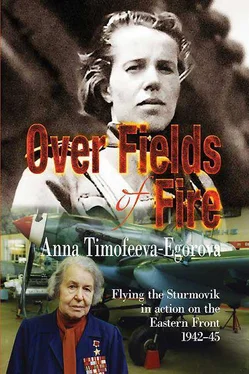“Permission to head off, Comrade General?” I asked Parkhomenko.
“Granted! Take the package and a wounded man, and don’t be angry at an old fellow like me. All sorts of things happen in war. I took you for a bloke, and you’re…” Something gentle appeared in the General’s eyes, he awkwardly waved his hand and gave a shy, boyish smile.
Everyone in the squadron already knew of my woes — a message had been sent by the radio operators of the cavalry corps that had set up communications. Coming back to my aerodrome I landed and taxied to the parking lot, but didn’t find Lieutenant Alexeyev’s plane. Everything was scattered around the place in some disorder.
“What’s happened?” I asked Dronov the mechanic.
“Lieutenant Alexeyev died…”
“Who was he flying with?”
“His navigator was Lieutenant Grachev. Grachev is alive but badly crippled…” My heart began to ache, tears welled up, and barely shifting my feet I walked away from the parking lot.
“What are you doing, Egorova, dragging your feet instead of walking?” I heard the angry voice of Major Boulkin. “Where’s the package from the cavalry corps commander? Look a bit lively!”
I pulled the package out of my map case, handed it over to the major and went off to look for the squadron commissar Ryabov and the Party organiser Irkoutskiy. “How can this be?” I thought. “Our comrade, a pilot, has died… People should be called together to commemorate him. How can this be?”
I found neither Ryabov nor Irkoutskiy in place. They’d flown off on a mission before noon. To be frank, we were not overfond of Boulkin for his arrogance, dryness and roughness. But Alexey Vasilievich Ryabov was his exact opposite. The commissar had often flown as a lay pilot but would find time for a heart-to-heart talk, or a reprimand if one deserved it. However, if Ryabov had given a scolding no one would have resented it. The Party organiser Ivan Iosifovich Irkoutskiy was a good match for our commissar — a tactful, kind and thoughtful man. Irkoutskiy was especially good at locating encircled units. And he was an excellent navigator. In the squadron they joked that “Ivan would find the Fritzes 77 77 Editor’s note — the most common nickname for German soldiers in Russian military slang.
if they were underground”. Once, when searching for a cavalry detachment, Irkoutskiy and airman Kasatkin came across German tanks. The latter immediately opened fire on them but Irkoutskiy quickly noticed that in one village were some men with bales of hay, wandering between the houses. The navigator suggested Kasatkin land the plane. When they landed, it became clear that in the village was exactly the detachment they were looking for. In order to disguise themselves the cavalrymen had hidden the horses in sheds, outhouses and even dwellings. Thus the crew had carried out their mission this time too.
Irkoutskiy was regarded in the squadron as a ‘lucky one’. Once with the pilot Kasatkin he even landed straight on a minefield and everything came out ok — both survived unscathed. And once Irkoutskiy took off with the pilot Sborshikov to reconnoitre the roads near Nikolayev. En route they encountered 10 Ju-87s escorted by Me-109 fighter planes. The fighters pounced on the defenceless U-2, Sborshchikov landed the plane directly and he and Irkoutskiy ran from it in different directions. The Hitlerites made several passes on the plane, strafed the running airmen as well, but without success. The whole U-2 was holed but it hadn’t caught fire and the flyers, as the saying goes, ‘got off lightly’. When they came back home it turned out that our aerodrome had been bombed yet again — the whole airfield was sown with mines as if with tulips. How to land? There was a cross on the ground to forbid them from landing but nevertheless Sborshchikov touched down, manoeuvring between shell craters and mines during the run like a true circus artiste. The crew received a citation from Front Headquarters. But Sborshchikov was put on a charge by the squadron commander for landing when the inhibitory sign was on the ground.
“Egorova! You and me are fellow natives — I was born near Torzhok too”, once Irkoutskiy addressed me and asked: “Have you been getting letters from your mum?”
“Haven’t heard from her for a long time. I’m afraid the Fascists are raging around our parts. I fear for mum very much…”
“I haven’t heard from my mum for a long while either”, bowing his head, the partorg 78 78 Translator’s note — Party organizer.
said quietly, and went on: “Our comsorg 79 79 Translator’s note — Comsomol organizer.
told me the Comsomol recommended you to the Communist Party. So, I am ready to vouch for you. After all, Egorova, I joined the Party in 1939 and had been in the Comsomol since 1928. You see how old I am!”
“What are you talking about? You’re only 31”, I pointed out. “Are you married, Ivan Iosifovich?”
“No, Egorova, I haven’t got around to it. I haven’t had time. I had a girlfriend but she got married, giving up on me leaving the Army… Well, Egorova, Commissar Ryabov will give you the second reference — he told me about it himself”, our partorg added finally.
The Party meetings in our squadron had always been short, with minutes written in a condensed fashion — just the resolutions, and questions were discussed mostly in relation to admission of new members and candidates to the Party. The commissar had always been present at the meetings. The Battalion Commissar 80 80 Translator’s note — a military rank for political officers.
Alexey Vasilievich Ryabov wasn’t a skilled public speaker or a theorist. He was just a good man. With all his heart, with all his deeds the commissar had always tried to inspire the squadron personnel to carry out the tasks set us. And we had the same task as the whole nation — to destroy the enemy…
During one of the Party meetings I was accepted as Party candidate. It was in April 1942. At that time we were based in the settlement of Voevodovka near Lisichansk and the candidacy card was handed to me in the Southern Front headquarters. An officer from the political section presenting me with the card suddenly asked me:
“Comrade Egorova, aren’t you a sister of Vasiliy Alexandrovich Egorov?”
“No”, I answered glibly.
Later I would suffer a lot from my treachery towards my brother. How could I disown so heedlessly my elder brother who had taken the place of my late father for me? The bitterness still stings my soul. How could I answer that way? Many years later when my brother had been ‘rehabilitated’ and he had come to Moscow, I told him about it. He thought a bit, then smiled and said: “You were probably afraid they wouldn’t let you fight?”
“I did.”
“Oh, you cowardy-custard!” And my brother gave me a big kiss, forgiving my forced disavowal of him…
For the first time after my ‘Barvenkovo epic’ I managed to sleep my fill. A good sleep drove away the fatigue. Everything I had endured during the two most difficult flights was left somewhere behind and sunk in the depths of my memory. But at the same time it was clear to me that new ordeals were waiting for me. Sprightly, full of strength, I entered the squadron headquarters and the first thing that struck my eye was a large piece of paper fixed on the corridor wall. I was going to walk past but one of the airmen who chanced to be nearby said with a cunning smile: “Don’t turn your nose up, Egorova, read it — it concerns you.”
“Me?” I was surprised and went to the paper… Some amateur artist had depicted on it a fairy of the air drifting through a snowstorm. Under the friendly caricature was a caption: “A woman flies but the men have a day off!”
Читать дальше












